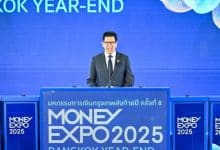Foreign funds return to Thai stocks amid Fed rate cuts

Foreign fund inflows show signs of returning to the Thai stock market in the second half of 2024, driven by the anticipated US Federal Reserve interest rate cut, a rebounding Thai economy, and the financial results of listed companies.
Soraphol Tulayasathien, Senior Executive Vice-President, highlighted that developing countries are experiencing increased production capacity for exports, signalling a global economic recovery.
Several major central banks have reduced their policy rates after three years of monetary tightening, as global disinflation trends align with targets, said Soraphol.
“Investors remain cautious, awaiting clarity on government economic stimulus measures and assessing the impact of capital market confidence-boosting measures announced in late June.”
The SET index closed at 1,300.96 points in June, a decline of 3.3% from the previous month and 8.1% from the end of 2023.
The average daily trading value was 45.2 billion baht (US$1.24 billion), marking a 22.9% decrease over the first six months of this year compared to the same period in 2023. Foreign investors have maintained a dominant trading position for the 26th consecutive month, despite a net sell position totalling approximately 116 billion baht (US$3.12 billion).
The Thai capital market continues to attract new listings, with six firms on the SET and 11 on the Market for Alternative Investment, raising a combined 15.6 billion baht (US$428 million) in the first half of 2024, Soraphol added.
“Investors are eagerly awaiting the Fed’s first rate cut later this year, as historical data shows that the Fed’s rate cuts have typically been a boon to emerging markets.”
Thailand’s macroeconomic indicators are improving, with exports and tourism outperforming expectations.
“The benign imports for private-sector production and the higher government spending on consumption and investment, following earlier budget delays, indicate a robust economic outlook in the second half.”
The uptick rule was enforced at the beginning of this month to reduce daily short-selling volume and SET index volatility. Additionally, the lockup period for investment in the Thai ESG fund has been shortened, aligning it more closely with the former tax-deductible long-term equity fund, reported Bangkok Post.
This adjustment is expected to attract more domestic institutional investment, potentially boosting the SET index in the future.
Latest Thailand News
Follow The Thaiger on Google News:


























